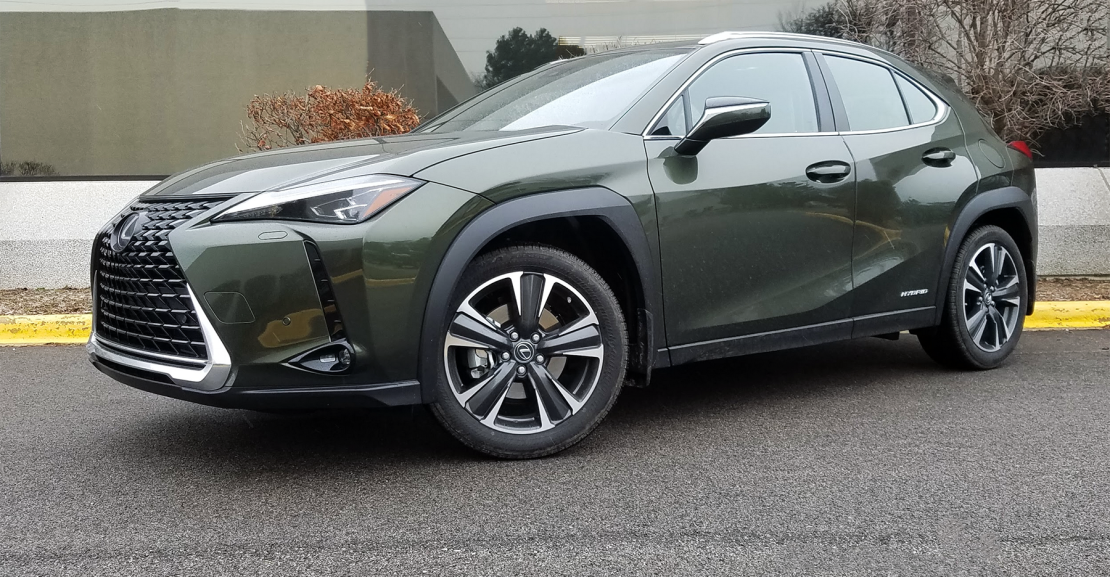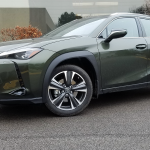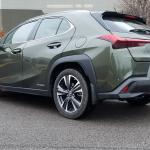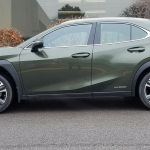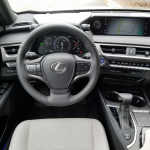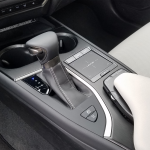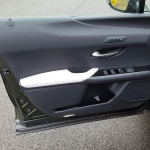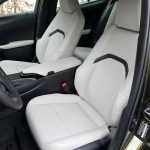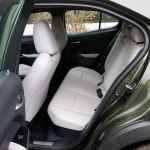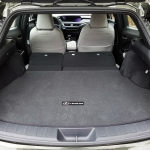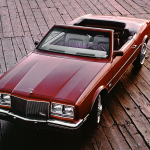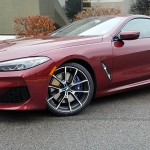
 2020 Lexus UX 250h Luxury AWD
2020 Lexus UX 250h Luxury AWD
Class: Premium Subcompact Crossover
Miles driven: 295
Fuel used: 7.6 gallons
Real-world fuel economy: 38.8 mpg
| CG Report Card | |
|---|---|
| Room and Comfort | B |
| Power and Performance | C |
| Fit and Finish | B+ |
| Fuel Economy | A |
| Value | B+ |
| Report-card grades are derived from a consensus of test-driver evaluations. All grades are versus other vehicles in the same class. Value grade is for specific trim level evaluated, and may not reflect Consumer Guide's impressions of the entire model lineup. | |
| Big & Tall Comfort | |
| Big Guy | B |
| Tall Guy | B |
| Big & Tall comfort ratings are for front seats only. "Big" rating based on male tester weighing approximately 350 pounds, "Tall" rating based on 6'6"-tall male tester. | |
| Drivetrain | |
| Engine Specs | 181-hp 2.0-liter |
| Engine Type | 4-cyl hybrid |
| Transmission | CVT automatic |
| Drive Wheels | AWD |
Driving mix: 50% city, 50% highway
EPA-estimated fuel economy: 41/38/39 (city/highway/combined)
Fuel type: Regular gas
Base price: $39,550 (not including $1025 destination charge)
Options on test vehicle: Wireless charger ($75); windshield de-icer ($100); head-up display ($500); triple-beam LED headlamps with auto-leveling, washers, LED fog lamps and cornering lamps ($1660); parking assist, rear cross-traffic alert with braking ($565); heated steering wheel ($150); carpet cargo mat ($110); door-edge guards ($150); rear bumper applique ($85); illuminated door sills ($425), mudguards ($160)
Price as tested: $44,555
Quick Hits
The great: Fuel economy from hybrid powertrain; build quality
The good: Well equipped with standard features; quiet cabin
The not so good: Cramped rear seat; so-so cargo space; interior ambiance isn’t quite as lush as some class rivals; roof design compromises rear visibility
More UX price and availability information
John Biel:
What exactly is “luxury?” In an automobile, it can seemingly be whatever a manufacturer decides it is.
Consider the UX premium-subcompact crossover sport-utility from Lexus. Available in a choice of gas-engine 200 or gas/electric-hybrid 250h, it also comes in three ascending states of trim: base, F Sport, and Luxury. Review the window sticker of a 2020 UX Luxury like the 250h that Consumer Guide tested, then slip into the cabin, and you’ll see that its expression of luxury is based more on equipment than on environment.
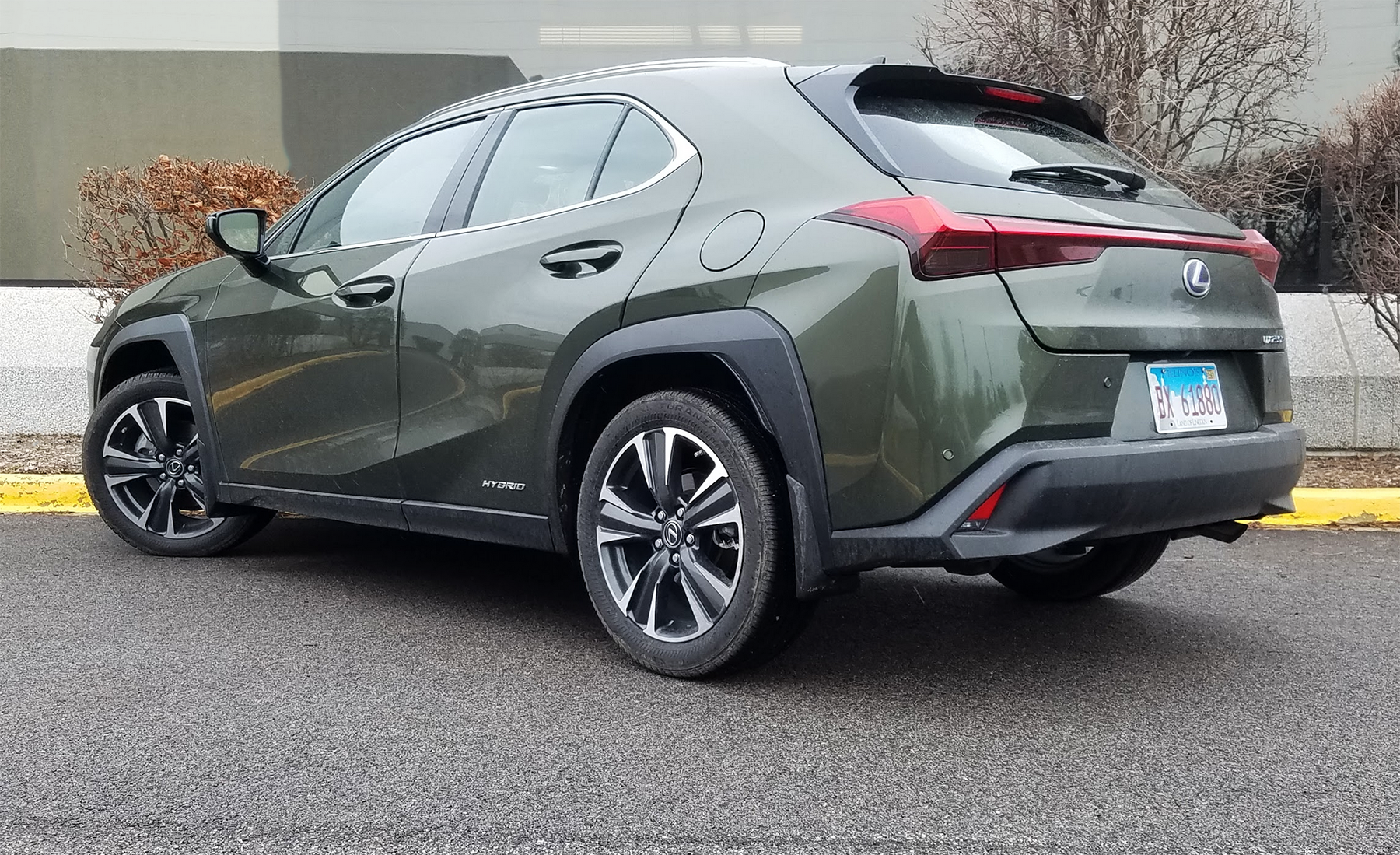
Seat and armrest upholstery are done in Lexus’ “NuLuxe” leatherette—the only material available. Owners won’t touch real leather unless they select the optional heated steering wheel. Door panels are nondescript with virtually no sculpting or detailing, and the tops of the rear ones are made out of stiff plastic with no underlying give. There’s just one rear-seat storage pouch, attached to the back of the front passenger seat, and no pockets or bottle holders in the rear doors. A lot of non-premium vehicles provide this much or more, especially in their “luxury”-trim models, and they don’t start at $40,575 with delivery, like the UX 250h Luxury does.
Test Drive: 2020 Mazda CX-30 Premium
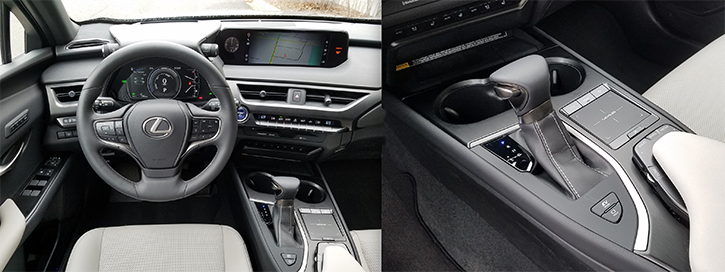
What, then, does Lexus give buyers for that money? More stuff, like:
- navigation system
- memory settings for driver’s seat and external mirrors
- heated and ventilated front seats
- LED-illuminated air-vent knobs
- front-door aluminum sill scuff plates
- power moonroof
- hands-free power liftgate
- rain-sensing windshield wipers
- auto-dimming outside mirrors with tilt-down in reverse
- blind-spot monitor
- rear cross-traffic alert
The only nods to improving the sensory perception of luxury are acoustic glass in the front-door windows for added cabin quiet, and textured washi dashboard trim that replicates the soft grain of paper familiar from the shoji sliding doors of traditional Japanese houses.
Test Drive: 2020 Lincoln Corsair Reserve
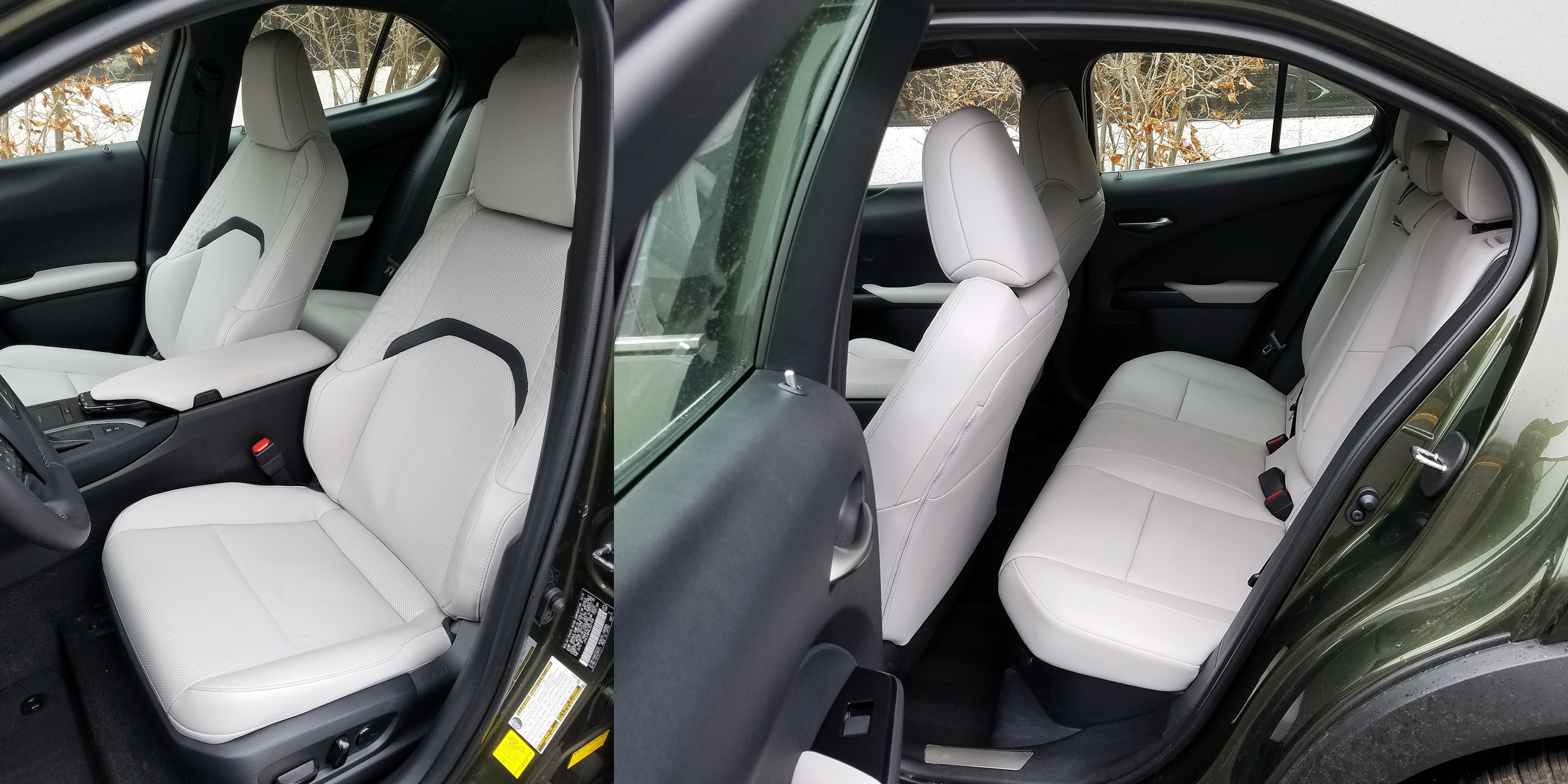
One of things Consumer Guide has claimed to like about the UX since its 2019-model-year debut is interior quality, and that isn’t necessarily at odds with the limitations listed above. Fit and assembly are excellent, and the cabin is pleasingly quiet. Seats are comfortable—though rear-seat room (for two adults tops) is hardly abundant. If, as suggested, luxury can be measured in the number of features, then the high-line UX has that going for it, too. In addition to the items that kick in as standard at the Luxury level, the little ute also has automatic dual-zone climate control, 8-speaker audio, satellite radio, Lexus Enform app suite, Wi-Fi hotspot, new Android Auto smartphone compatibility (Apple CarPlay had already been available), a 10-way-power driver’s seat and 8-way-power passenger seat, SmartAccess keyless entry, push-button starting, rear cargo cover, and carpeted floor mats. All UXs come with Lexus Safety System+ 2.0, comprised of forward collision warning and mitigation with pedestrian detection, lane-keep assist, adaptive cruise control, road-sign assist, and automatic high-beam headlights.
There’s more that can be added to a UX, even a Luxury model, and CG’s tester had a goodly share of options and accessories on the way to a $44,555 bottom-line price.
Quick Spin: 2020 Volvo XC40 Inscription
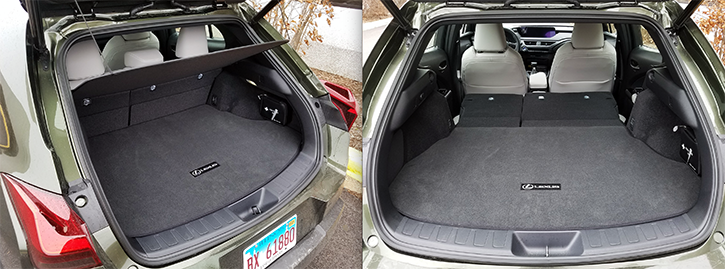
The UX’s infotainment system may have all the functionality that a modern driver could want, but it is controlled by Lexus’ Remote Touch Interface, which is no fun to use. Fingertip motions and taps on a console-sited touchpad are supposed to locate and activate desired functions, but it’s hardly precise—especially in a moving car—and a distraction from the road. Climate-system operation rests with a bank of clearly marked buttons, though we’d prefer quick-setting dials for things like temperature and fan speed.
The 250h has the distinction of being the only hybrid in the premium-subcompact SUV segment. It combines a 2.0-liter 4-cylinder gas engine, continuously variable transmission, and two electric motors that drive the rear wheels (at speeds below 44 mph). Total system output is 181 horsepower. CG tested a 2019 250h F Sport with the same driveline, and we’ll refer you to that report for performance details, which are unchanged. Fuel economy remains one of the things on which the UX hybrid hangs its hat, and that bore itself out in our test of the 250h Luxury. For instance, this reviewer averaged 40.98 mpg after a stint of 55.4 miles, just 24 percent of which was in the city-type driving that is best for hybrids, but that approximated the EPA estimate of 41 mpg in city use. Highway and combined estimates are pegged at 38 and 39 mpg, respectively.
Test Drive: 2019 Audi Q3 S Line
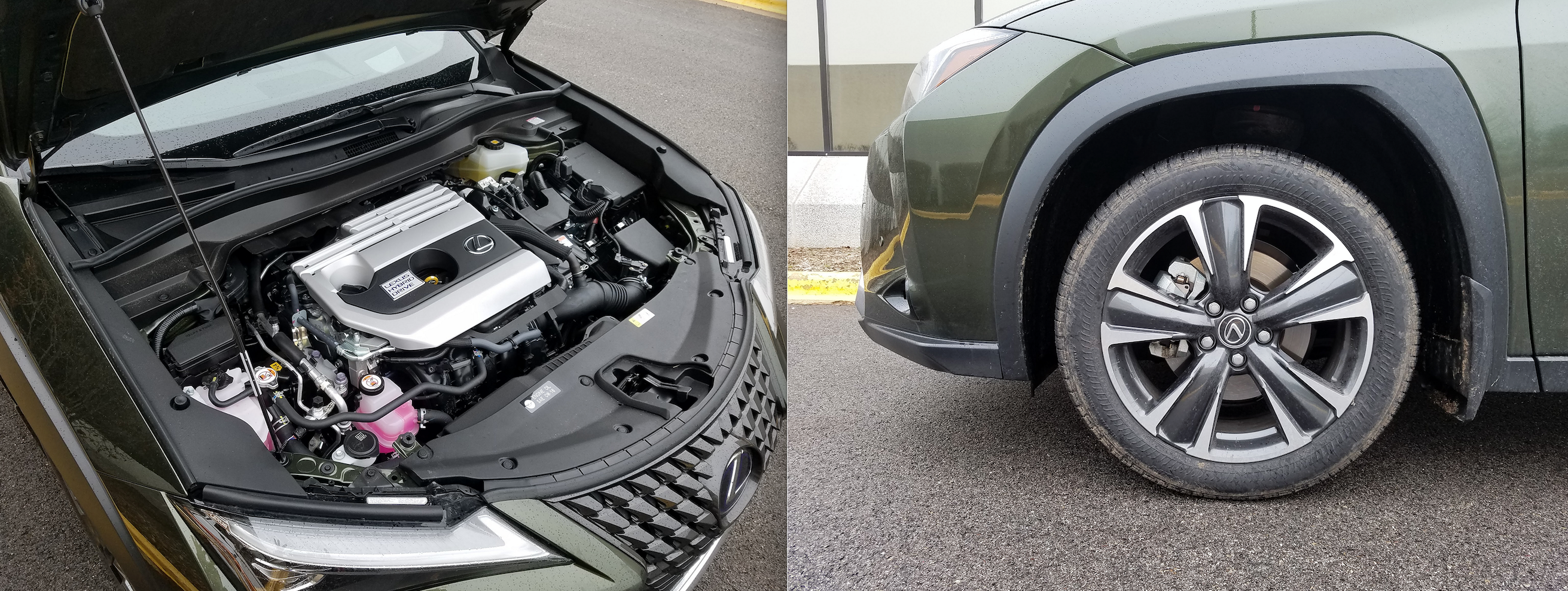
There are some compromises related to the UX design. The hybrid has a raised cargo floor to clear the hybrid battery, which results in an overall loss of 4.6 cubic feet of capacity relative to the 200 version. (However, there is some small-item storage in a segmented foam organizer under the floor.) The 60/40-split second-row seats fold flat, but in the hybrid, they rest slightly lower than the level of the cargo deck. There’s also a smaller gas tank in the hybrid. Plus, there’s some penalty in rear-corner vision to be paid for the UX’s aggressively styled rear quarters.
An exact, universally acknowledged definition of luxury may be hard to come by. Shoppers interested in a small SUV—especially one that’s a hybrid—don’t have to accept Lexus’ definition of it, considering that most of what’s included in the UX Luxury is available to pick and choose as options in the cheaper models. Choice is a nice luxury, too.
Test Drive: 2019 Cadillac XT4 Sport
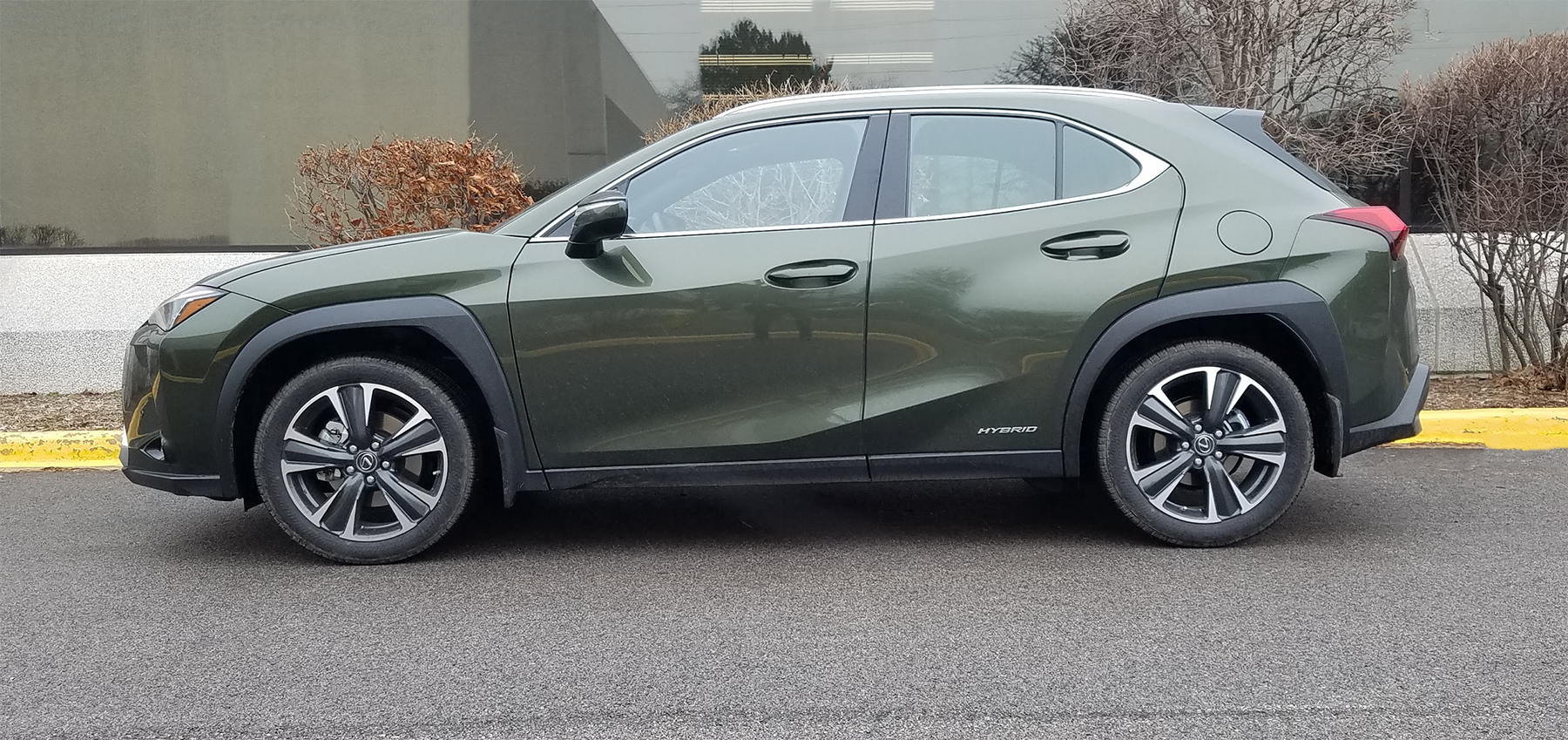
Check out the Consumer Guide Car Stuff Podcast
2020 Lexus UX 250h Gallery
2020 Lexus UX 250h

